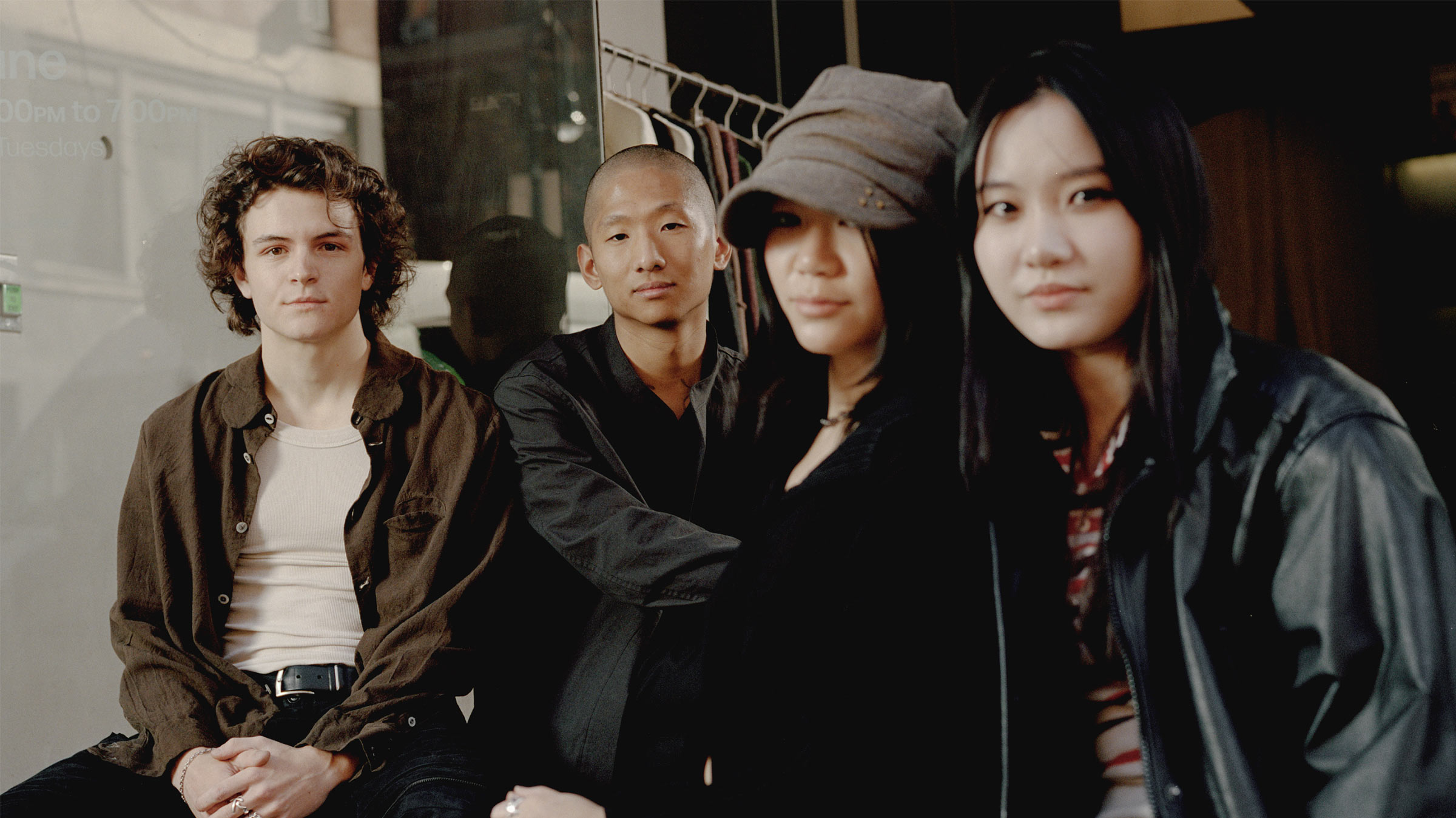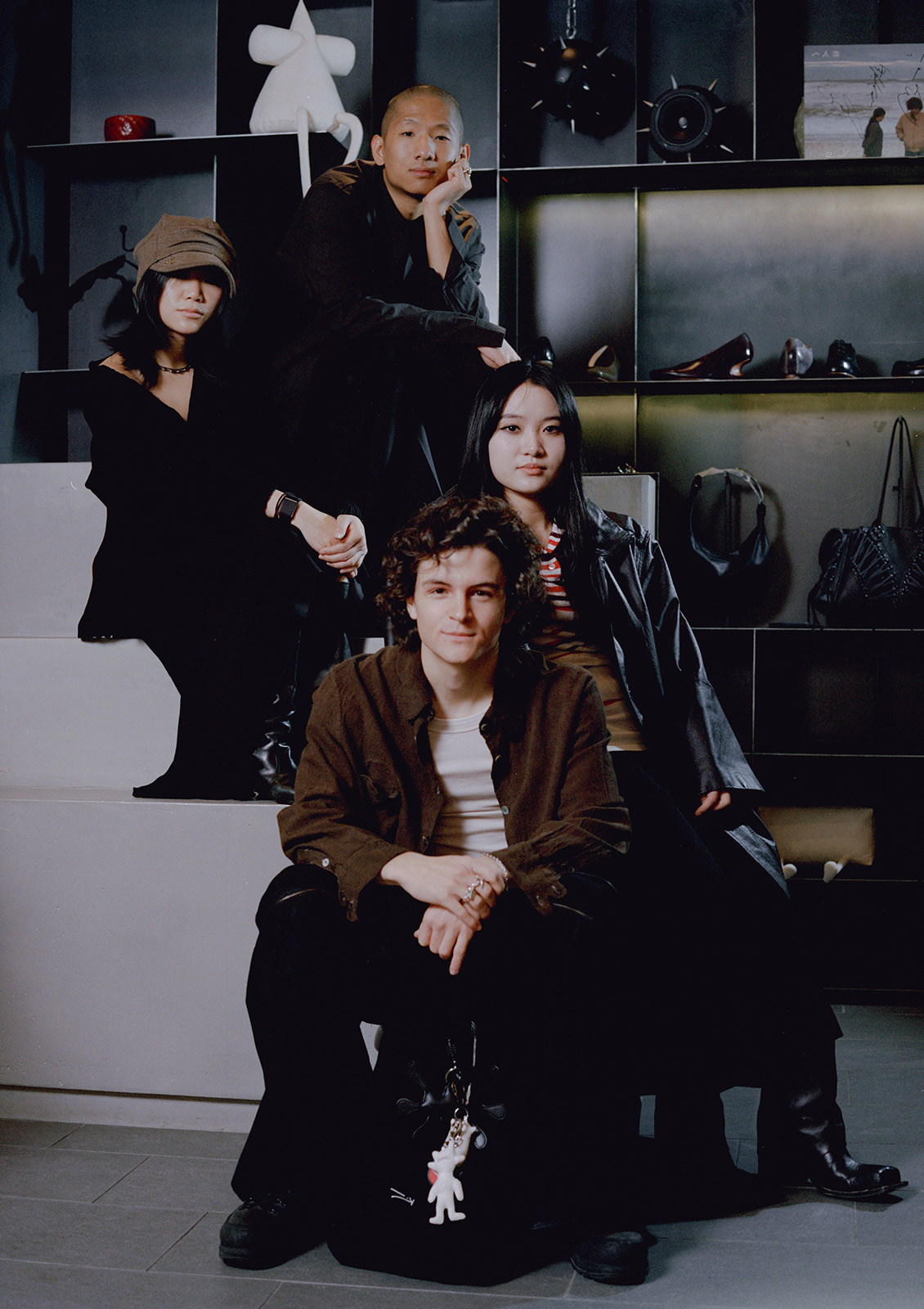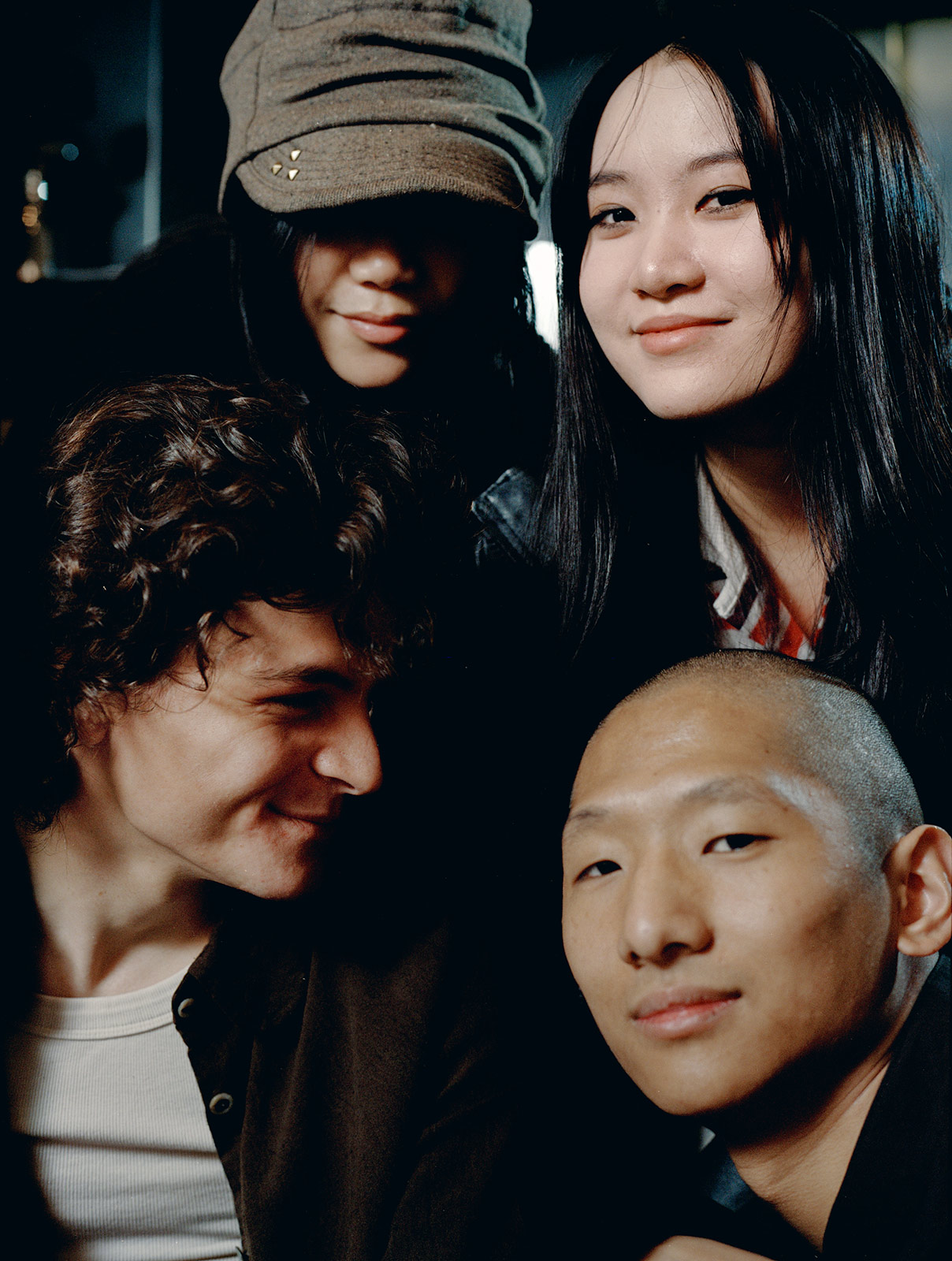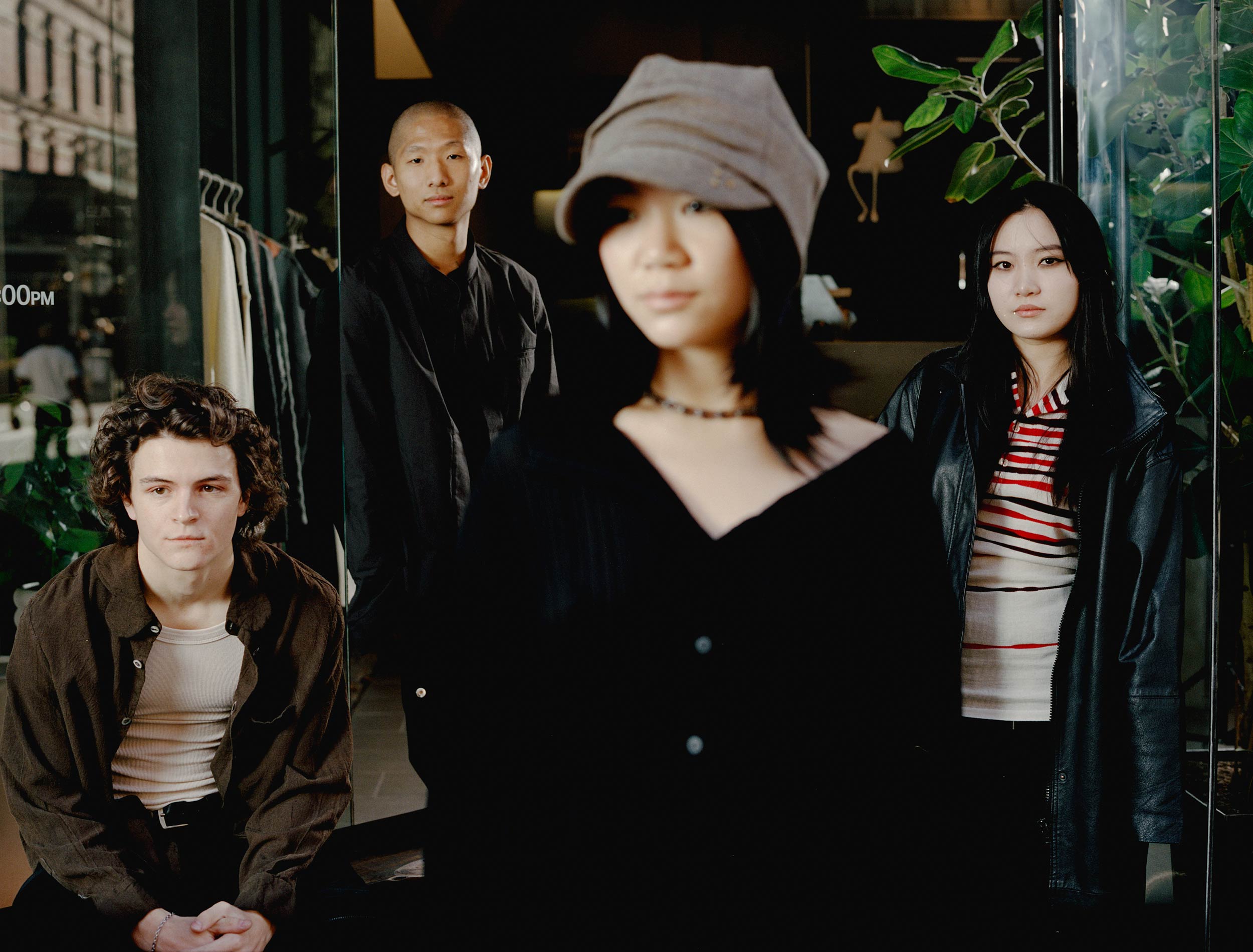On a sunny Friday afternoon, two college-aged girls walk into Komune, the newest addition to the Lower East Side’s iconic roster of both vintage and designer stores. One girl eagerly introduces herself to Komune co-founder Brandon Fogarty, then proceeds to show him pictures of her own clothing designs off of her phone. “You made this?! This is you?! No way!” says Fogarty, taking the phone from her and pinching the screen to get a closer look. “You should bring some of your stuff with you the next time you visit,” he suggests. “I’d love to,” she replies. She flashes an excited glance back at her friend.
Komune is a breeding ground for exchanges like this. At face value, the space is a dark, brutalist oasis that flaunts a penchant for subversive design—sleek concrete and gray stone tiles stoically blanket its walls and floor. The store’s fare includes clothing, accessories, and home goods made by independent designers carefully chosen by the buying staff on a season-to-season basis. All products maintain a certain utilitarian cohesion and grayscale color palette, complementing the rawness of the store’s physical design. Spindly, Giacometti-esque sculptures and stone accents litter the shop’s jet black shelves and plots of floor below each rack.
But Komune is not the stereotypically strictly-surveilled designer retailer—it’s a fashion lover’s playground. Upon entry, employees offer tea and water (which are served in custom metal tea cups imprinted with the store’s logo, a delicately hand-drawn letter ‘K’). The staff encourages customers to touch, feel, and try on clothing, often pulling pieces from racks and performing impromptu styling sessions on the floor. A meeting space complete with pillows and matching a dark wood bench and coffee table set allow clients to converse and connect. The Komune ethos is simple: invest in authentic design, and above all, people.
“Why we talk about this relationship we have with our brands and with the people that work with us is because we need them,” says second Komune co-founder Martin Li. He’s sitting at his desk in the store’s basement, where the team processes clothes, photographs pieces for the website, analyzes finances, eats, does dishes and occasionally sleeps—the store’s success often requires the team to work around the clock. “The same way that we want our customers to come into this space and meet, discuss, talk and feel like it is welcoming to them is the same way it came together.”
Li and Fogarty met in high school, where they began their first foray into fashion business by reselling sneakers and Supreme online. By the end of their senior year, the duo had created a full-fledged cut and sew brand called Sammé Annen, complete with an experiential collection and business plan. It was a glimpse of what was yet to come—this same urge to reconceptualize the designer retail store as an interactive site for artistic liaising is what drives Komune today. The two reconnected in college, meeting once a week “to do something bigger,” says Fogarty. “We wanted a presence of the things that we liked in a space that could bring people together who share the same interests as us.”
After ideating together, receiving a friendly slap in the face from current operations and finances lead Lia Feng (“At some point she basically said, ‘What the fuck are you guys doing?’” says Li), settling on a multi-brand retailer as the finalized store concept, and hosting Komune’s overwhelmingly successful pop-up for the month of September 2023, the team—along with the addition of strategy lead Alex Tao and womenswear buyer and e-commerce developer Cassie Mao—took a year-long hiatus to work on a permanent return to their Lower East Side space.
Komune reopened its doors this past August, stocking over 14 designers in store and even more online. Finding brands that aligned with the team’s design sensibilities—and nonetheless agreed to work with the then unheard of store—was, at first, “like a college application process,” says Feng, referencing the safety-target-reach approach they’d employ to get designers on board with their vision. Now, with a physical storefront in the eye of the Lower East Side’s storm of fashion flâneurs (that Orchard Street sweet spot no further north of Grand nor south of Delancey) and a combined digital following of 44k, brands apply to be platformed by Komune in droves. The team’s sourcing process has become significantly easier—but no less meticulous.
“It starts with: there’s visual interest here. Then let’s take a look at the story behind it. What is their approach to process?” says Fogarty. “I love when there’s more going on, when there’s an actual intent behind the design that’s not inherently commercial. From there, we’ll get to the quality check process and balancing price point. There’s a lot of factors that come in.” Li expands, “Does the brand have a reason to exist? If the answer is a clear yes, very often, the designs, the quality, and everything else follows. They just check the boxes themselves.”
One sweeping glance around Komune is enough visual evidence of the team’s careful brand selection. Jutting out of the walls are cubbies that hold a different designer’s work, in effect highlighting the individuality of each brand. On the left hangs Shanghai-based brand Fax Copy Express’s “elevated basics,” as Mao describes them, featuring buttery soft fleeces and perfectly low-waisted flared and oversized jeans. Shoe brand Doys’s Black Turin clogs are a fascinating blend of the traditional Dutch shoe and Mary Janes. Inspired by Korean wrapping techniques is Gsongim’s Bojagi bag, which is slouched on a shelf beside a pocket-sheathed and lamb-leathered shoulder purse from Greco. SF10G’s striped and see-through polos hang adjacent to Isa Boulder’s trypophobia-inducing multi-pocket pants, while Niceworkshop’s aluminum home goods shine on a back cement ledge.
“Togetherness, inclusivity and community are the key themes to Komune’s success—the sales are auxiliary.”
Li likens Komune’s layout to that of a museum: “To be a good curator for a museum is to not only capture what’s going on right now, but also challenge the people that come through the door,” he says. “The reason behind these portals, in a sense, is to represent the process behind the designs.”
The team has also cultivated close relationships with the brands themselves, a testament to the Komune ethos of kinship through design. “Designers come in whenever. Ben Greco has become a good friend of ours,” says Fogarty, plopping onto a large ruched leather bean bag hidden amongst racks of unpackaged clothing in the basement. “He made this. Like, he’ll just pull up while closing and be like, ‘I have more goodies for you!’”
Korean designer Terry Shin from Blackmerle is a frequent collaborator with and friend of Komune as well. “Blackmerle has become what we’re known for,” says Mao, standing in front of the brand’s section on the storefloor. Jackets with blossoming sleeves and mangy mohair sweaters hang from the rack. “When we work with Terry, it feels like a family business.”
Whether scouting designers for their next season or providing fashion advice to followers on TikTok, the notion of family underscores everything the team accomplishes at Komune. And they practice what they preach; Li, Fogarty, Mao and Feng even live and walk to the store together, bringing their familial instincts from home into the workspace. To them, togetherness, inclusivity and community are the key themes to Komune’s success—the sales are auxiliary.
“If you come into fashion through this lens of appreciation as opposed to social capital, then there’s suddenly a community around there that also shares this more intellectual approach to it,” says Fogarty. “Everybody can have a safe space to nerd-out. Selling is just a benefit for us that sustains what we’re trying to do.”
A man boasting a Cheshire-wide smile suddenly walks into the basement office, interrupting Li. He balances a box of pizza in the palm of his hand, emitting a sheepish “Surprise!” Li flashes an endearing eye-roll; an existing friendship between the two is immediately apparent. “We met at the store and now everytime he comes by, he brings me food,” Li says. “That’s the most validating part—when people decide to come back for the sake of just coming back.” Mao and Fogarty’s laughter echoes throughout the basement as the team’s friend makes his way to them. In a city where clothing often overshadows community, Komune proves the seemingly impossible: that with the right people and mindsets, both can exist at once.













